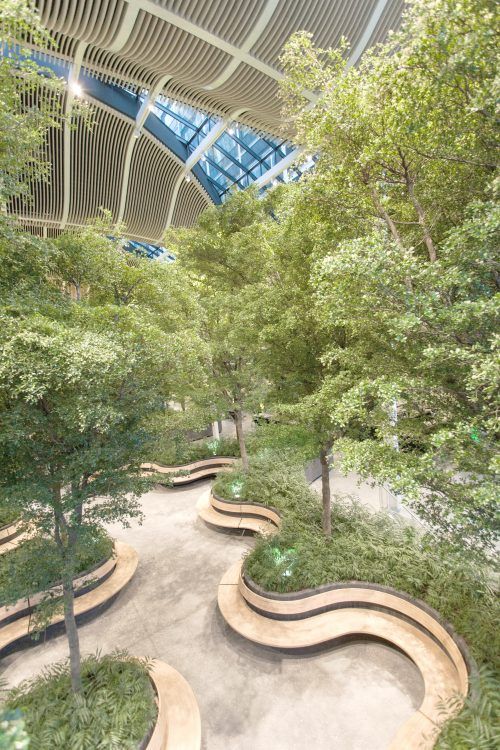This season the museums and attractions of Copenhagen are all about sustainability, green energy, and recycling. ‘Going green’ has fast become a competitive worldwide trend and the city of Copenhagen is no exception to that.
In fact Copenhagen was elected European Green Capital in 2014 and aims to become the world’s first CO2-neutral capital by 2025. The Copenhageners excel in sustainable solutions: cycling, organic eating and green energy.
Go eco-friendly touristing in Copenhagen; stay at one of the city’s many eco-certified hotels, and visit this season’s special exhibitions themed around climate, energy consumption and waste recycling.
Trash Talk
ongoing, ends April 17; Wasteland at Danish Architecture Centre, Strandgade 27B, Cph K; open daily 10:00-17:00, until 21:00 on Wed; 60kr, under-18s: free adm; dac.dk
Let’s talk about trash: floors made of car tyres, ceilings made of plastic bottles and walls made of scrap wood.
This spring’s special exhibition at the Danish Architecture Centre, Wasteland, challenges our way of looking at rubbish. Every year 1.3 million tonnes of waste is produced in Denmark alone, and waste production is fast growing in both volume and toxicity.
These days, architects and designers are therefore looking into how we can recycle our plastics, metal and paper – making one man’s trash into another man’s treasure. Wasteland is a window into an imminent future, when waste will play a crucial role in the way we live, work and consume. The exhibition takes you on a journey of transformation from waste products to new materials, buildings, and even whole new urban areas made entirely of waste.
Getting in the Zone
permanent exhibition: Energy Zone at Experimentarium, Tuborg Havnevej 7, Hellerup; open 09:30 most days, until 17:00 Fri-Wed, until 20:00 on Thu; over-12s: 185kr, under-12s: 105kr; experimentarium.dk
Just recently the brand new Experimentarium science centre reopened in Hellerup north of Copenhagen. Experimentarium is a stimulating and hands-on exhibition place for children (of all ages) to get in touch with their inner scientist. In Energy Zone the focus is on energy consumption and alternative energy sources. Experiment with environment-friendly energy and generate your own power.
Get a clear sense of how much power it requires to watch TV when you have to pedal hard in order to keep the TV turned on. In the CO2 Powerplay game you fight for the environment and for consumers in a race to keep society on its feet and the natural world alive.
Water Works
ongoing, ends March 21; The Water at The Cisterns, Søndermarken, Frederiksberg; open 11:00-17:00, closed Mon; 60kr, under-18s: free adm; cisternerne.dk
In 2017, one of the main exhibitions at The Cisterns in Søndermarken is a spectacular underground walk on an ocean of light and darkness. The prominent and internationally recognised Japanese architect Hiroshi Sambuichi is regarded as one of the top experimentalists of sustainable architecture who approaches the global challenges of today.
This exhibition at The Cisterns will take form as a wondrous installation in which Sambuichi’s approach to – and investigation of – the existing architecture and surroundings will be demonstrated. The Cistern’s cave becomes a self-sufficient energy scape – an isolated cycle between water, light, air, plants and humans.
It is an underground landscape that visitors can venture into, investigate and experience, between contrasts of unfathomable darkness and areas of subtle
daylight.
Diesel Drives the World
permanent exhibition: Diesel powers the world at DieselHouse, Elværksvej 50/Energiporten 8, Cph SV; open Mon-Thu 10:00-16:00, First and third Sun of the month 10:00-13:30, closed Fri-Sat; free adm; dieselhouse.dk
Spend an exciting day at the DieselHouse and give in to your inner technology nerd. The DieselHouse holds one of the world’s largest diesel engines, The HC Ørsted engine from 1933. In the industrial society of the 1900s, the diesel engine became just as important as the steam engine was in the previous century.
The diesel engine was the driving force of all large ships, providing society with commodities, materials and fuel. It propelled ferries, trains and construction machinery of all kinds. Since the first engine was created, the diesel engine has undergone an immense development when it comes to fuel consumption, and today it is designed to work on all kinds of more eco-friendly fuel: natural gas, hydrogen and even plant oil.
Learn the whole fascinating story and follow the development of diesel technology from the late 1800s to the present – and get a glimpse of the future too.
For more inspiration from the museums, visit Copenhagen Museums & Attractions














